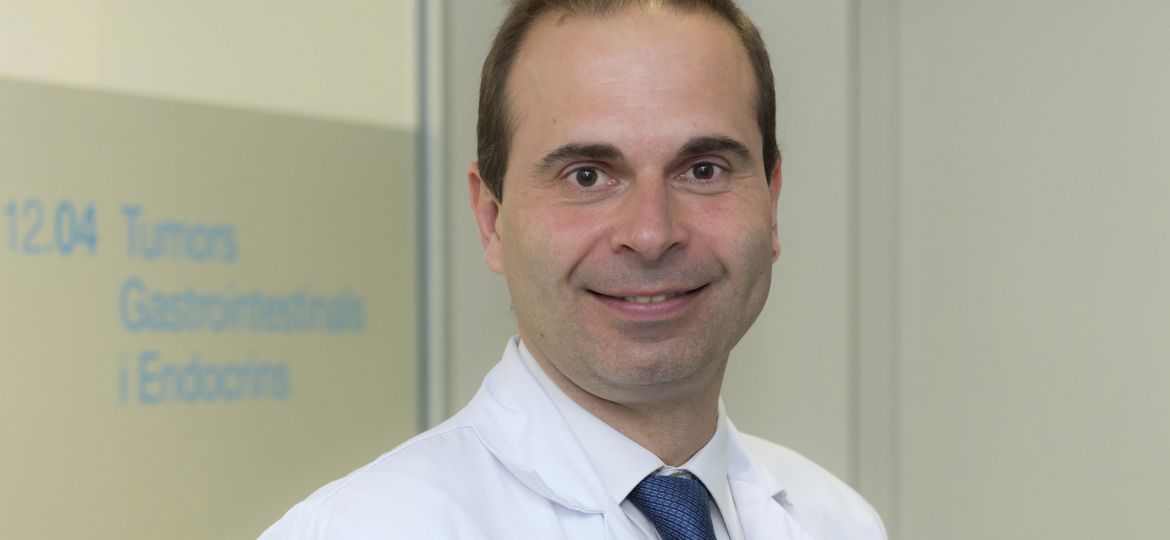
- Results of the DUTHY exploratory phase II study evaluating dual immune checkpoint blockade with durvalumab and tremelimumab show promising activity in patients with progressive, refractory advanced thyroid cancer.
- Aimed at defining the optimal sequence of chemotherapy and everolimus in patients with advanced and progressive pancreatic neuroendocrine tumors, data from the phase III SEQTOR trial show that chemotherapy assigned as first treatment achieves significantly higher overall response rates compared with the reverse sequence. These findings point to a change in clinical practice.
- Both studies are supported by the Spanish Group for Neuroendocrine and Endocrine Tumors (GETNE), a cooperative multidisciplinary academic group committed to promoting clinical trials to advance the treatment and care of patients with these rare tumors.
Neuroendocrine tumors (NETs) are rare and can either develop slowly or progress very rapidly. The rarity of these cancers represents a challenge in running clinical trials for these patients. The Spanish Group for Neuroendocrine and Endocrine Tumors (GETNE) brings leading experts together to help overcome associated obstacles and supports academic clinical trials for patients with neuroendocrine neoplasms. Among these are studies that have been designed to seek out novel strategies for patients with progressive, refractory advanced thyroid carcinoma.
Presented during this week’s annual Congress of the European Society for Medical Oncology (ESMO), 09 – 13 September, Paris, France, results from the DUTHY – GETNE-T1812 (1) and SEQTOR – GETNE 1206 (2) studies, both (co) led by Jaume Capdevila, a Senior Clinical Investigator of VHIO’s Gastrointestinal and Endocrine Tumors Group, show promise in improving outcomes for patients with advanced progressive thyroid carcinoma and pancreatic neuroendocrine tumors (panNETs).
Dual immune checkpoint blockade with durvalumab plus tremelimumab in patients with advanced thyroid cancer
Thyroid cancer is the most common endocrine cancer. Life expectancy for patients with advanced refractory disease is between three to six months, and currently there are no other alternative treatment options available. While immune-based cancer therapy continues to step up across an increasing number of tumor types, strategies that block immune checkpoint proteins, including PD-1, PD-L1, have had limited success as monotherapy in this patient population.
“Preclinical research (3) has evidenced the potency and synergistic effect of combining a PD-L1 inhibitor with CTLA-4 blockade, with increased efficacy in advanced thyroid cancer. Based on these promising findings, we developed a clinical trial to evaluate this novel combination,” says Jaume Capdevila, Principal Investigator of this present study and Medical Oncologist at the Vall d’Hebron University Hospital’s Medical Oncology Department (Vall d’Hebron Barcelona Hospital Campus) headed by VHIO’s Director Josep Tabernero.
The phase II DUTHY – GETNE-T1812 study was designed to assess the safety and efficacy of combining durvalumab, a monoclonal antibody that binds to the PD-L1 protein to boost immune cells to destroy more cancer cells, with tremelimumab; a novel monoclonal antibody against CTLA-4 that stimulates an immune system attack on tumors and allows cytotoxic T lymphocytes (CTLs) to continue to kill tumor cells.
This prospective, open-label trial recruited 68 patients with thyroid cancer who were divided into three cohorts based on respective tumor type: differentiated thyroid carcinoma, medullary thyroid carcinoma, and anaplastic thyroid cancer. In the first two groups, patients had to have received at least two prior lines of therapy. This criterion did not apply to patients with progressive refractory, advanced anaplastic thyroid carcinoma since these patients have a dismal prognosis and there are no other approved treatments that can improve their survival.
Data show that the objective response rate was 33.3% in patients with anaplastic thyroid cancer, 15.8% in those with medullary thyroid carcinoma, and 8.1% in patients with differentiated thyroid cancer.
“In all groups we observed a survival rate of more than one year. This is highly significant considering that patients with differentiated thyroid carcinoma and medullary thyroid cancer had been heavily pretreated, with no other current treatment options. The results observed in patients with anaplastic thyroid cancer are particularly striking. The dual targeting of PD-L1 and CTLA-4 doubled life expectancy,” adds Jaume Capdevila, President of GETNE.
“Data also show that the combination of these two immunotherapies is tolerable and safe and that this dual checkpoint blockade shows promising activity in these patients. This novel strategy significantly prolongs overall survival and could open up a new treatment avenue, particularly for patients with anaplastic thyroid cancer who have now achieved a year of survival,” concludes Capdevila, who presented this data during a Proffered Paper session during this week’s ESMO Congress 2022 (1).
Elucidating the best sequence: chemotherapy versus everolimus as first line treatment in patients with advanced progressive pancreatic neuroendocrine tumors
Streptozotocin based chemotherapy, which is only indicated in the treatment of pancreatic neuroendocrine tumors (panNETs), and protein kinase inhibitor everolimus are frontline treatments in patients with advanced and progressive disease. Switching between both upon progression is a common strategy, but the best sequence has not been well established.
The GETNE-supported randomized open label phase III academic SEQTOR study, initiated by the trial’s Principal Investigator Ramón Salazar, Head of the Medical Oncology Department at the Catalan Institute of Oncology (ICO, Barcelona) over ten years ago, was designed to compare the efficacy and safety of first line everolimus followed by streptozotocin upon progression or the reverse sequence, in advanced progressive panNETs.
The SEQTOR study investigators, co-led by VHIO’s Jaume Capdevila, have now elucidated the best sequence. Data presented by Ramón Salazar during the same Proffered Paper session (2) evidence that both sequential strategies showed similar efficacy. Progression-free survival data show that the order of selection between the two treatments is of little relevance, whereas the choice of sequence is of important significance in terms of objective response rates.
“We have observed that the use of chemotherapy triples the objective response rate over everolimus, suggesting that streptozotocin should be the first option when tumor shrinkage is a priority to perform tumor resection, or avoid complications deriving from the size of the tumor that could be potentially life-threatening,” says Jaume Capdevila, senior author of this present study.
This striking difference in objective response rate is important since many oncologists do not currently opt for chemotherapy as first line as they consider it to be a more toxic treatment option. “Data show that streptozotocin has a similar level of toxicity as everolimus. These present results point to an important change in clinical practice. While progression-free survival is barely impacted by the order of the two treatments, the initial response rate is very different,” concludes Capdevila.
References:
1. Jaume Capdevila, Maria Plana, Beatriz Castelo, Lara Iglesias, Jorge Hernando, Ricardo Yaya Tur, Neus Baste, Alberto Carmona-Bayonas, Sofia Ruiz, José Trigo, Isabel Lorenzo-Lorenzo, Enrique Grande, David Lorente, Lisardo Ugidos, Gloria Marquina, Alejandro García-Alvarez, Miren Taberna, Julia Villamayor, Javier Molina-Cerillo, Teresa Alonso-Gordoa. Durvalumab (D) plus tremelimumab (T) for the treatment of patients with progressive, refractory advanced thyroid carcinoma: The DUTHY (GETNE-T1812) trial.
ESMO Congress 2022 session details:
Proffered Paper session: NETs and endocrine tumours
Date: Monday, 12th September
Session Time: 16:30 – 18:00h
Presentation Number: 1645O
Speaker: Jaume Capdevila
Lecture Time: 17:25 – 17:35
2. Ramón Salazar, Salvatore Tafuto, Merete Krogh, Alex Teulé, Rocio Garcia-Carbonero, Heinz Josef Klümpen, Birgit Cremer, Isabel Sevilla, Barbro Eriksson, Elizaveta Tabaksblat, Jean-Philippe Metges, Nicholas Simon Reed, Joerg Schrader, Valentí Navarro, Vicente Valentí, Jorge Hernando, Ana Maria Colao, Lene Vestermark, Carlo Carnaghi, Jaume Capdevila. Randomized open label phase III study comparing the efficacy and safety of everolimus followed by chemotherapy (CT) with Streptozotocin (STZ)-5FU upon progression or the reverse sequence, in advanced progressive panNETs: the SEQTOR study (GETNE 1206).
ESMO Congress 2022 session details:
Proffered Paper session: NETs and endocrine tumours
Date: Monday, 12th September
Session Time: 16:30 – 18:00h
Presentation Number: LBA45
Speaker: Ramón Salazar
Lecture Time: 16:30 – 16:40h
3. Lorch JH, Barletta JA, Nehs M, et al. A phase II study of nivolumab (N) plus ipilimumab (I) in radioidine refractory differentiated thyroid cancer (RAIR DTC) with exploratory cohorts in anaplastic (ATC) and medullary thyroid cancer (MTC). J Clin Oncol. 38, no. 15_suppl (May 20, 2020) 6513-6513.















